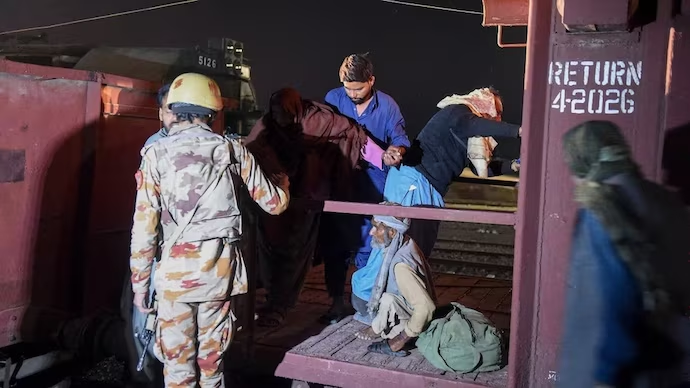
H2: Balochistan Train Hijacking Sparks Diplomatic Tensions Between Pakistan and Taliban
In a dramatic escalation of regional tensions, the Taliban Denies-led Afghan government has rejected Pakistan’s allegations that Afghanistan-based militants were involved in the hijacking of the Jaffar Express train in Balochistan. The incident, which occurred on March 13, 2025, has intensified the fraught relationship between the two neighboring nations.
H3: The Incident: Militants Hijack Quetta-Peshawar Passenger Train
On Tuesday, armed separatists stormed the Jaffar Express, a passenger train traveling from Quetta to Peshawar, taking dozens of hostages. The attackers, identified as members of the Baloch Liberation Army (BLA), a pro-independence militant group, released passengers after six hours following negotiations with Pakistani security forces. No casualties were reported, but the brazen attack has raised alarms about Pakistan’s worsening security crisis.

H3: Pakistan Points Finger at Afghanistan
Pakistani officials claimed the attackers communicated with handlers in Afghanistan during the hijacking. Major General Ahmed Sharif, Pakistan’s military spokesperson, stated, “We have evidence that Afghan soil is being used to plan and execute attacks against Pakistan.” The accusation reflects Islamabad’s longstanding concerns about cross-border terrorism, particularly from Baloch separatist groups allegedly sheltering in Afghanistan.
H3: Taliban Rejects Claims as “Baseless”
The Taliban Denies swiftly denied Pakistan’s allegations. Abdul Qahar Balkhi, spokesperson for Afghanistan’s Foreign Ministry, called the claims “irresponsible” and urged Pakistan to address its internal security challenges instead of shifting blame. “Such remarks will not resolve Pakistan’s domestic issues,” Balkhi asserted, underscoring the deepening mistrust between the two nations.
H2: Baloch Liberation Army Claims Responsibility
The BLA, a banned separatist group fighting for Balochistan’s independence, claimed responsibility for the hijacking. In a statement, the group accused Pakistan of exploiting Baloch resources and committing “human rights violations.” The BLA has intensified attacks on infrastructure and security forces in recent months, signaling a resurgence in the decades-long Baloch insurgency.

H3: Geopolitical Context: Why Balochistan Matters
Balochistan, Pakistan’s largest province, is rich in natural resources but remains its poorest region. The province has been a hotspot for separatist movements since 1948, with groups like the BLA demanding autonomy. The conflict has drawn international attention due to China’s multi-billion-dollar CPEC investments in the region, which militants frequently target.
H2: SEO-Optimized Analysis: Key Takeaways for Readers
- Rising Militancy: The hijacking highlights Pakistan’s fragile security amid escalating Baloch insurgency.
- Pakistan-Afghanistan Relations: Accusations of cross-border terrorism threaten to derail already strained diplomatic ties.
- Balochistan’s Strategic Significance: The region’s instability impacts China’s Belt and Road Initiative and regional security.

H3: Implications for Regional Security
- For Pakistan: Rising attacks expose gaps in counterterrorism strategies.
- For Taliban Denies: Denials aim to project legitimacy as a governing force amid global scrutiny.
- For China: CPEC projects face renewed risks, potentially delaying economic plans.
H2: How This Story Affects Global Audiences
- Investors: Security risks in Balochistan could deter foreign investment.
- Diplomats: Escalating Pakistan-Afghanistan tensions may require international mediation.
- Researchers: The BLA’s tactics signal a shift toward high-profile, symbolic attacks.
Taliban Denies Pakistan’s Accusations Over Balochistan Train Hijacking; BLA Claims Responsibility
The Taliban has rejected Pakistan’s claims that Afghanistan-based militants orchestrated the hijacking of the Jaffar Express train in Balochistan on March 13, 2025. Pakistani officials alleged that attackers communicated with handlers in Afghanistan during the incident, which saw armed separatists storm the Quetta-Peshawar passenger train, holding hostages for six hours before releasing them.
The Baloch Liberation Army (BLA), a militant group fighting for Baloch independence, claimed responsibility, accusing Islamabad of exploiting the region’s resources and committing rights abuses. Taliban Denies spokesperson Abdul Qahar Balkhi dismissed Pakistan’s allegations as “baseless,” urging Islamabad to address its internal security challenges rather than shifting blame.
The hijacking underscores escalating tensions between Pakistan and Afghanistan, with Islamabad long accusing the Taliban Denies of harboring anti-Pakistan militants. Balochistan, Pakistan’s largest and most resource-rich province, has been a flashpoint for separatist violence for decades, fueled by grievances over political marginalization and economic neglect.

The BLA’s resurgence, marked by attacks on infrastructure and security forces, threatens China’s Belt and Road Initiative (CPEC), which relies heavily on Balochistan’s strategic routes. Analysts warn the incident could strain fragile diplomatic ties further, complicating regional counterterrorism efforts.
For Pakistan, the attack highlights vulnerabilities in its counterinsurgency strategy amid rising Baloch militancy. For the Taliban Denies, the denial reflects efforts to project legitimacy as Afghanistan’s governing authority amid global scrutiny. Meanwhile, China faces renewed risks to its CPEC investments, potentially delaying economic projects.
As accusations fly, the hijacking exposes how regional instability, rooted in historical grievances and geopolitical rivalries, continues to undermine security and development in South Asia. International observers fear the fallout could deepen if mediation efforts fail to address the Baloch conflict’s underlying causes.
- Balochistan Train Hijacking
- Taliban Pakistan Conflict
- Baloch Liberation Army (BLA)
- Afghanistan-Pakistan Relations
- Balochistan Insurgency
- Jaffar Express Attack
- Cross-Border Terrorism
Table of Contents
Call to Action:
Stay informed on evolving South Asian security dynamics. Share this article and subscribe for real-time updates on Pakistan-Afghanistan relations and regional conflicts.


